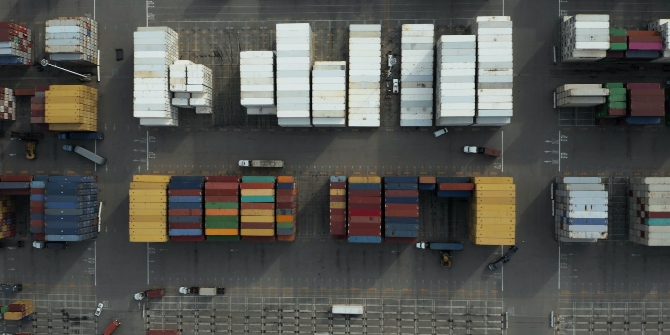
The current Covid-19 outbreak is raising a number of growing concerns about the UK economy and its capacity to cope with the current situation and recover in the near future. One particular area of concern, in the UK and elsewhere, is related to international trade, i.e., trade of goods and services across countries. More specifically, the World Trade Organisation is currently expecting a fall in the value of international trade in 2020 roughly between 10% (optimistic scenario) and 30% (pessimistic scenario).
International trade is vital for the UK economy, as well as for other economies, in a number of dimensions such as international demand for domestic products, the availability of foreign products and inputs that are beneficial to both consumers and businesses, and the increasingly important global value chains. In this very moment, international trade in the UK and across the world is experiencing a strong slowdown that might be comparable, if not higher, in magnitude to the one observed in 2008-2009 during the Great Recession. Despite clear differences in the underlying nature of the economic shock and other aspects, we believe that what we learned from the 2008-2009 international trade collapse and subsequent swift recovery might be useful to help us understand the future implications of the current trade collapse.
World trade in manufactures fell by about 30% in nominal terms between the first quarter of 2008 and the second quarter of 2009; the strongest drop since the Great Depression in the 30s. While some countries experienced episodes of sharp sectoral drops in exports or imports prior to 2008, the 2008-2009 trade collapse was remarkably wide-ranging across industries and highly synchronised across countries, and its magnitude also substantially exceeded the fall in world GDP. Despite widespread fears and gloomy scenarios, international trade recovered quite swiftly from the 2008-2009 collapse, and was back to pre-collapse levels by the end of 2010, continuing to increase afterwards.
As first highlighted in Behrens et al (2013) for Belgium, and subsequently confirmed by a number of other studies covering several developed and developing countries, one key reason for this high degree of `flexibility` characterising international trade is the fact that, over the entire length of the trade collapse, firms trading internationally were not selling or buying fewer products and/or selling to or buying from fewer countries. They were simply selling or buying less of each product to/from each country. In other words, firms kept alive their full portfolio of products and international clients and suppliers, while scaling down the values of individual transactions.
In this respect, there is abundant evidence that firms incur substantial fixed costs when adding a new product to their production process and/or when finding a new client or supplier. Furthermore, these fixed costs are mainly sunk so that if a firm drops a product and/or a supplier and/or a client, it will incur substantial fixed costs again to reintroduce a product and/or re-establish connections with a client or supplier. These fixed sunk costs are key to understanding firms’ behaviour and their response to a large-scale shock.
In particular, during the 2008-2009 trade collapse the economic downturn and uncertainty about the future were not long/strong enough for firms to start dismantling their portfolio of products and international clients and suppliers and so international trade could recover quickly as soon as the situation improved. In this light, if the current economic downturn and uncertainty about the future is not too long and/or too strong, one can reasonably presume that international trade will also rebound quickly once the economic environment ameliorates. In this respect, the strong reactions of both the UK government and the Bank of England with policies to sustain UK businesses and consumers’ spending will likely play an important role in reducing the length of the economic downturn and the uncertainty of the economic environment, paving the way for a swift recovery of international trade.
♣♣♣
Notes:
- This blog post draws on the author’s 2013 article Trade crisis? What trade crisis?, with Behrens, K., and Corcos, G., Review of economics and statistics, 95(2), 702-709.
- expresses the views of its author(s), not the position of LSE Business Review or the London School of Economics.
- Featured image by Tyler Casey on Unsplash
- When you leave a comment, you’re agreeing to our Comment Policy
 Giordano Mion is a professor of international trade at the University of Sussex, an associate at the LSE Centre for Economic Performance’s trade programme. He is also affiliated with the Centre for Economic Policy Research (CEPR), the Center for Economic Studies and the Ifo Institute (CESifo) and the National Institute of Economic and Social Research (NIESR). He received a PhD in economics in 2004 from the Université Catholique de Louvain in Belgium. He is currently a member of the editorial board of the Journal of Economic Geography.
Giordano Mion is a professor of international trade at the University of Sussex, an associate at the LSE Centre for Economic Performance’s trade programme. He is also affiliated with the Centre for Economic Policy Research (CEPR), the Center for Economic Studies and the Ifo Institute (CESifo) and the National Institute of Economic and Social Research (NIESR). He received a PhD in economics in 2004 from the Université Catholique de Louvain in Belgium. He is currently a member of the editorial board of the Journal of Economic Geography.





